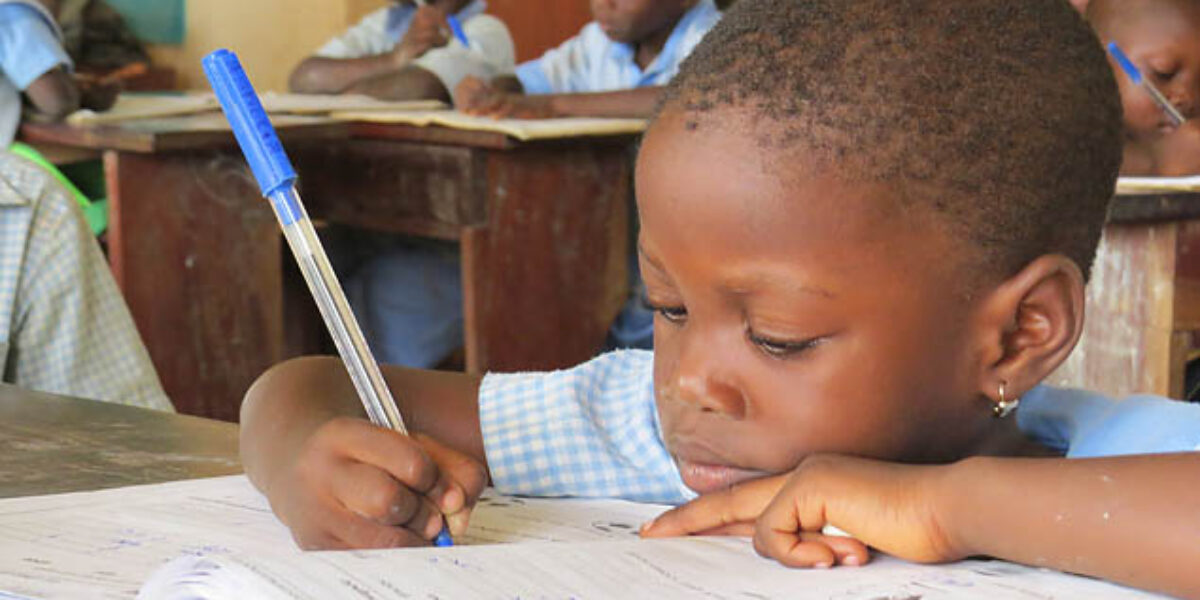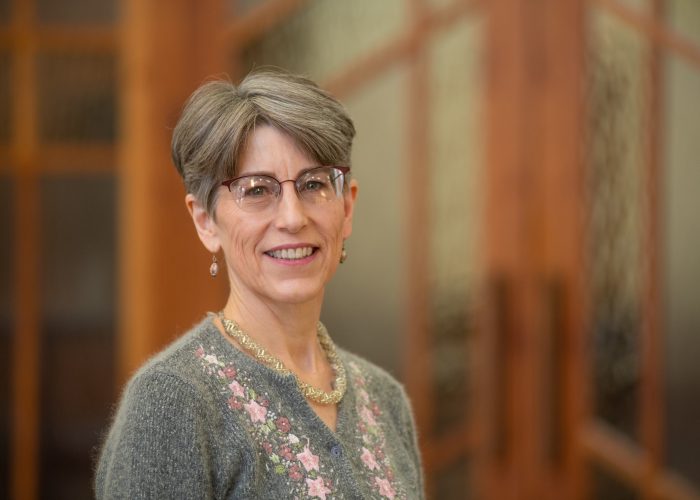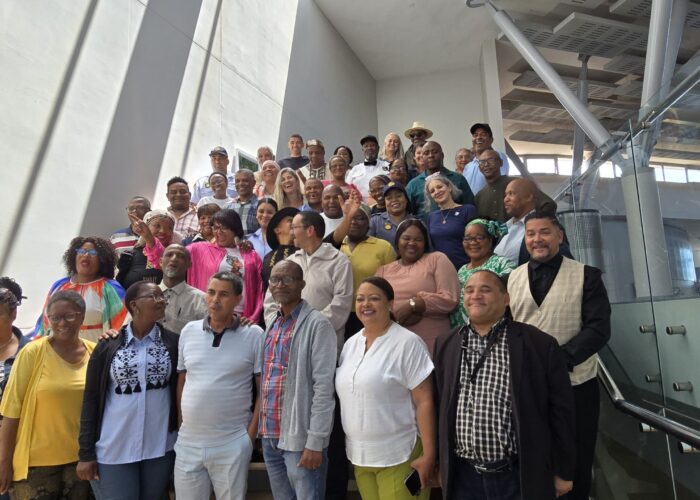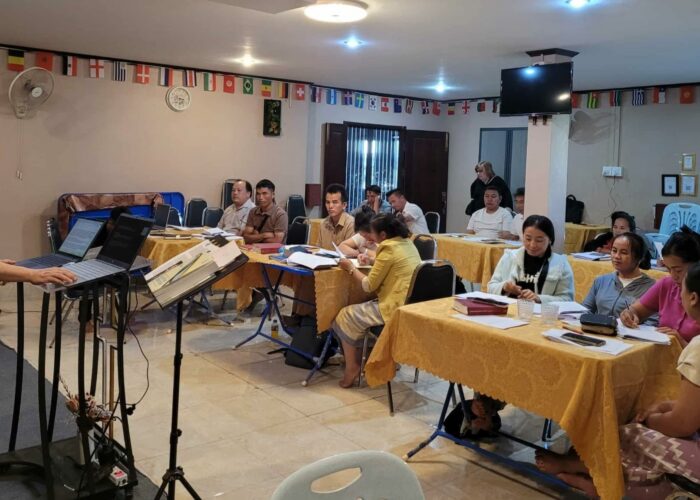ALLADA, Benin (Mennonite Mission Network) – Despite the presence of more than 200 children within the walls of a spacious compound in the West African country of Benin, the ochre-colored-brick buildings and lush greenery exude peace and harmony. It lives up to the name painted above the entrance gate, Village d’enfants Fifatin (Place of Peace Children’s Village).
In 2000, La Casa Grande (The Big House) opened its doors to a handful of children. The name reflected a hope, rather than the reality of the modest single-family dwelling in Benin’s largest city, Cotonou, two hours south of the current location in Allada. Today, the ministry has the capacity to be family to 40 children. Population increases exponentially during school hours when students from the surrounding area arrive for classes, education being one aspect of the organization’s growing vision.
“We never refer to our children as orphans,” said Bienvenu Kadja, who has added the role of La Casa Grande’s assistant coordinator to his permanent position as director of finances. “All have a father, God, who loves them very much. Rather, we talk about children in difficult situations.”
International network supports ministry
La Casa Grande began as a partnership between the 125-member Burgos Mennonite Church in Spain and the Christian community in Benin, with Mennonite Mission Network walking alongside from the project’s conception.
“The Burgos church provides [much] of our revenue,” Kadja said. “This is amazing when you think of how small the church is and how severe the economic crisis is in Spain.”
Steve Wiebe-Johnson, Mennonite Mission Network’s director for Africa, referred to the African proverb, “It takes a village to raise a child,” when he said, “It has taken a few cities, a few congregations in Spain, Canada, the United States and France, plus lots of volunteers to make La Casa Grande. Mennonite Mission Network, as one of many contributors, has provided key pieces along the way.”
Moving beyond the walls into community development
La Casa Grande’s administrative council is always searching for ways to make more efficient use of the funds that Mennonites and their communities give so sacrificially, Kadja said.
Placide Hounsokpo, a staff social worker, suggests one way this can happen. He emphasizes that the best place for children is in their biological families. In response, La Casa Grande invests resources to help extended families care for the children of relatives who have died. This new insight is leading La Casa Grande into community development.
Because land is becoming impoverished from years of improper farming methods, those who live off the land are becoming ever poorer, Kadja said.
“Many people here in Allada don’t have enough to eat, but we have learned that if we can help the families, they will be able to take care of their children. It is not good for us to be comfortable here in our little nest when the people around us are suffering,” Kadja said.
 Download full-resolution image.
Download full-resolution image.Extending education to community
Another way of responding to the needs of the community is to help educate their children. With this in mind, La Casa Grande created a school, Les Leaders (Leaders), where 197 students are enrolled in grades 1-6.
Impressed by the witness of the Mennonites in their midst, the municipality of Burgos, Spain, donated funds for building the school. Last year, three years after opening its doors, the school was able to pay teachers’ salaries and materials with the income from student fees – even though they charge less than any other school in the area, Kadja said.
However, La Casa Grande is looking for ways to increase the teachers’ salaries. A library and computer lab project is also stalled and waiting for funding.
As an alternative to the academic route, La Casa Grande facilitates apprenticeships where young people learn trades through working with local business owners, like electricians, seamstresses and welders.
Sawmill allows local Christian artisans to support ministry
Another gift from Spain was a sawmill, which permits youth to develop carpentry skills. Desks, benches and tables for the school were built with lumber from the sawmill. A cooperative of Christian woodworkers gives leadership to this aspect of La Casa Grande’s ministry, which also provides income from the furniture they craft. Sawing planks from trees that local people harvest is another source of income.
Other ways La Casa Grande contributes to the physical and spiritual well-being of their community are through Saturday Good News Clubs for children of Allada and weeklong summer camps where biblical truths are taught, games are played, and bodies are nourished with healthy food.
Health, next big challenge
The next challenge for La Casa Grande is the health of the surrounding community. Cholera is a problem, as is maternal and child health.
In the past months, three women and two babies have died in childbirth. One of the artisans who works for La Casa Grande lost his wife and the cook lost her baby. Recent arrivals at La Casa Grande, Vivien and Vivienne, are twins whose mother died in childbirth.
Hope in life’s rubble
Every day at La Casa Grande starts with Bible study and worship. Kadja frequently draws inspiration from Nehemiah in the Old Testament. He loves how the community, with the leadership of Nehemiah, pulled the stones of the devastated city of Jerusalem out of the dust and rebuilt the walls.
“There is hope even in the rubble of our lives,” Kadja said. “We are not only working for the future of our children, but for the salvation of our nation and the whole world. When our children leave La Casa Grande, they will bring God’s word to their families and beyond.”
###
For immediate release
Mennonite Mission Network, the mission agency of Mennonite Church USA, leads, mobilizes and equips the church to participate in holistic witness to Jesus Christ in a broken world. Media may contact news@mennonitemission.net.




